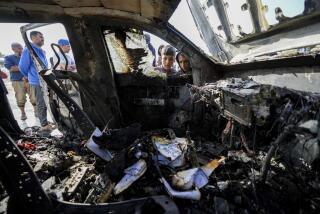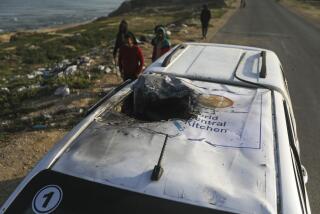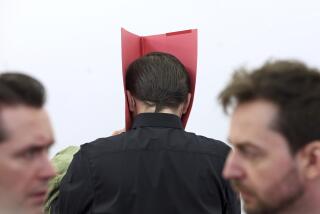7 Life Terms for Israeli in Killing of 7 Palestinians
JERUSALEM — A district court in Tel Aviv on Sunday sentenced a cashiered soldier to seven life terms in prison, one each for the murder of seven defenseless Palestinian workers he gunned down last May on a highway curbside.
At the time of the shooting, the government described the Israeli suspect, Ami Popper, as deranged, and his lawyers pleaded that their client was incompetent to stand trial. But three judges, noting that Popper had the presence of mind to reload four times as he fired on the sitting laborers, declared him guilty of a senseless crime, “unprecedented”’ in Israeli history.
When the verdict was read, Popper pounded the table in front of him and shouted, “No! No!” Relatives spat abuse at the judge and prosecutor.
The slayings, which took place in Rishon Le Zion south of Tel Aviv, ignited three days of protests and riots among Palestinians that led to a sharp army crackdown that left 13 Arabs dead. The outrage echoed to the United Nations, where a Security Council condemnation of the shooting was stymied by a U.S. veto.
In a gesture meant to preclude early release, the judges ordered that the life terms be served consecutively and added a 20-year sentence for attempted murder of 10 Palestinians wounded by Popper as he fired an automatic rifle into a crowd of 50 day laborers. Popper cannot be paroled unless Israel’s largely ceremonial president commutes the sentences.
Popper, who had been discharged from the army after repeated disciplinary problems, argued that he was trying to kill one of the Arabs, who he claimed had molested him as a child. A team of psychiatrists hired by his attorney backed the court ruling that Popper, 22, was mentally fit to stand trial. He later confessed to the crime on his lawyer’s advice.
The killings set off an intensified cycle of violence between Palestinians and Israelis as underground leaders of the Arab uprising in the West Bank and Gaza Strip called for attacks on Israeli soldiers and civilians. Moderate Palestinian leaders were discredited. Several had held a hunger strike in protest of the shooting and demanded U.N. protection for the population under occupation, but the United States vetoed U.N. action after a guerrilla group from the Palestine Liberation Organization coincidentally attempted an assault on Tel Aviv beaches.
For a while, Palestinians were afraid to cross into Israel for work. Tens of thousands hold mainly menial jobs in the Jewish state and provide key labor in the construction industry and on farms.
Recently, Palestinians were forbidden to work inside Israel because of their support for Iraq in the Persian Gulf War. Since the war ended, five Israelis have been stabbed to death in Jerusalem by Palestinians. Four of the victims, all women, were killed at a bus stop last week on the eve of U.S. Secretary of State James A. Baker III’s visit to Israel.
Sunday, for the first time since the stabbings, the army allowed Palestinian workers to re-enter Jerusalem. A ban on travel to Tel Aviv and Haifa, in effect since the beginning of the Gulf War on Jan. 17, was also lifted.
More to Read
Sign up for Essential California
The most important California stories and recommendations in your inbox every morning.
You may occasionally receive promotional content from the Los Angeles Times.










